#writer: brian michael bendis
Explore tagged Tumblr posts
Text
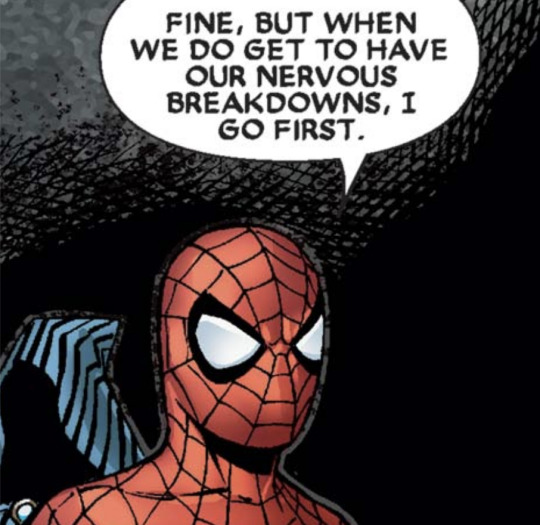
House of M #5 (2005)
#house of m vol 1#writer: brian michael bendis#artist: olivier coipel#year: 2005#decade: 2000s#spider-man
842 notes
·
View notes
Text
ultimate marvel sucked so much but at least it gave us the concept of somebody making a female clone of peter parker who's told point blank at her creation that even though she has all of peter parker's memories and knowledge and is, mentally, the 100% equivalent of peter parker, she'll be living life as a woman and with a woman's body regardless and that she'll be soooo happy about it so she just shouldn't have to worry. a concept that i am so normal about of course
#louposting#and then of course the part where peter parker's best friend gets a huge crush on her. chat he doesn't know#and the part where she was made by spider-man's archenemy on purpose because he knows peter parker is spider-man and hates him#unfortunately this incredible idea was conceived of by the legendarily bad writer brian michael bendis so it is genuinely very hard to read
24 notes
·
View notes
Text

SLOW THE FUCK DOWN Bendis is not all that
#what.#oh yes the most popular writer in comics. brian michael bendis.#i'm not saying he is not popular or acclaimed but THE MOST??#bffr#not even marvel comics. comics period.#at that point he mainly did marvel so how can you even say that#hashtag bendis is coming
19 notes
·
View notes
Text
Stan Lee Talks about the importance of change when it comes to the world of comics. Crazy how these complaints regarding change have only increased regarding comics.
Writer: Brian Michael Bendis / Penciler: Mark Bagley / Inker: Drew Hennessy / Color: Studio F / Letterer: D. Lanphear
#comics#comicbooks#Marvelcomics#Marvel#comicpanel

#Stan Lee Talks about the importance of change when it comes to the world of comics. Crazy how these complaints regarding change have only in#Writer: Brian Michael Bendis / Penciler: Mark Bagley / Inker: Drew Hennessy / Color: Studio F / Letterer: D. Lanphear#comics#comicbooks#Marvelcomics#Marvel#comicpanel#marvel comics#marvel universe#stan lee
11 notes
·
View notes
Note
im so curious what the damn pepperoni panel is
Okay so long ago (January 2013, 10 years go, dang) Brian Michael Bendis (he who fucked up modern Superman) was ruining X-men, and one of those things he did was "time displace" the original 5 X-men (Scott, Hank, Bobby, Warren, Jean) into the present, in his "All-New X-men" series.
In the 13th issue, this panel was published, which gets shared around a bunch as a meme.
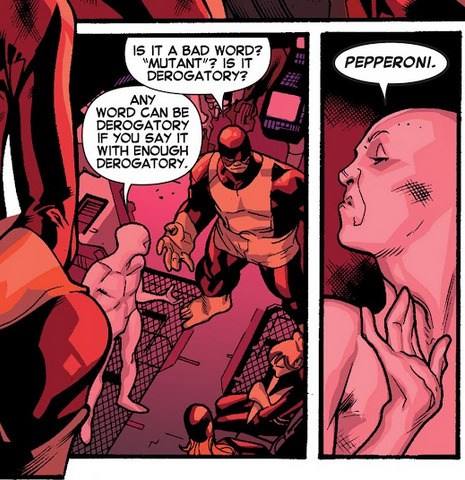
The "time displaced"/younger/naive Bobby Drake/Iceman making this comment, with the younger Hank Mcoy asking Professor Kitty Pyrde (Shadowcat) her option, which leads to the Professor giving this speech:
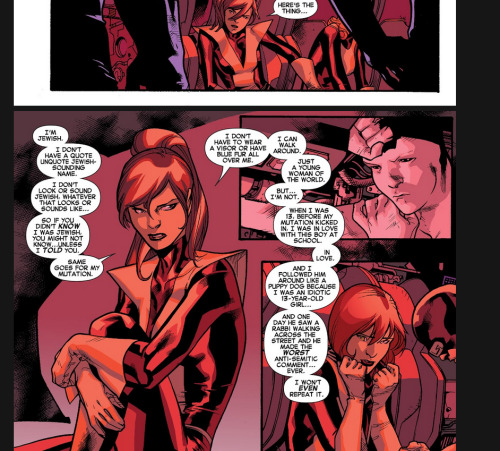
About how words do matter, and Kitty's own experiences with antisemitism.
I feel the context is important.
....
This is one of the better written scenes in the run (Bendis's failures on X-men compounded as things dragged on).
#bobby drake#kitty pryde#xmen#marvel#Bendis had some okay ideas but he took on way to many ideas/plots he was not equipped to handle with X-men#especially with the surrounding editorial and other writers#also he did not cooperate with other writers in ways he should have#Hickman especially#brian michael bendis
16 notes
·
View notes
Text
just when LOSH puttin my ass to sleep, bendis goes ahead and reminds us how utterly stunted jon’s emotional development is that he doesnt think there’s anything wrong with picking up his homie damian to tell him all about his 31st century discoveries 😭
#jon honey im so sorry these writers keep traumatizing you#jon kent#damian wayne#brian michael bendis#legion of super heroes: millennium#real talk#dc comics
9 notes
·
View notes
Text
Friendly, good natured reminder to the lesbians, as it looks like tonight will be a Wiccan backstory episode.

I love you, I’m with you, and Agatha x Rio will get their turn.
But Billy is a big deal, he’s headlined Marvel Pride literally every year since its inception, and it was horrific what Multiverse of Madness did to him (going from the “love is for souls not bodies” WandaVision ethos to “two of Marvel’s only queer characters exist exclusively in the imagination of the mentally ill woman we’ve now decided is homicidal and suicidal” 🙃).
He needs this moment. Wiccan x Hulkling (Wiccling), Marvel Pride & yes, Wanda—who was also blatantly character assassinated—they need this moment.
Before Jac Schaeffer has to hand them off to another writer (again).
We shouldn’t be in this position: Where Jac Schaeffer has to join the likes of Allan Heinberg, Anthony Oliveira, Tom King and Steve Orlando as Wanda’s cleanup writer in the MCU—battling Michael Waldron and Sam Raimi the way they have long done battle with misogynistic comics writers, like John Byrne and Brian Michael Bendis. Her colleagues should’ve treated WandaVision as the precious gift it was, not left her an editorial mess to clean up.
But this is where we are. Billy, Tommy & Wanda didn’t deserve to be discarded—they deserved proud legacies as representation for the women, people with mental health struggles, and queer youth who look up to them. So she’s fixing it. Then, she’ll get to the lesbians. Have a little faith and
Let her cook.
(And enjoy watching one of my all-time favorite characters step into his own!! Wiccan is a Gem 😊💙 & he supports the lesbians as much as you do, trust, lol.)
#billy maximoff#billy kaplan#teen agatha all along#wiccan#young avengers#teddy altman#Hulkling#wiccling#marvel pride#wandavision#agatha all along#agatha all along spoilers#aaa#aaa spoilers#agatha x rio#rio x agatha#agathario#lgbtqia#jac schaeffer#allan heinberg#tom king#anthony oliveira#steve orlando#Michael Waldron#sam raimi#brian michael bendis#john Byrne#tommy shepherd#speed#tommy maximoff
600 notes
·
View notes
Text
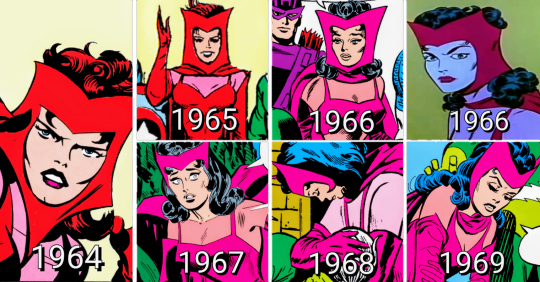
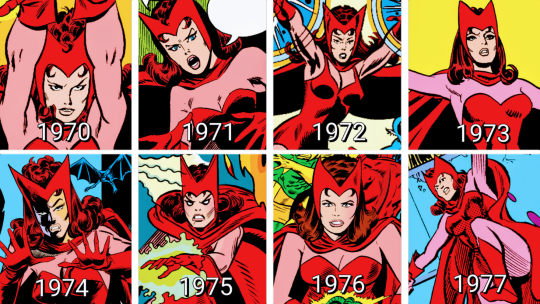

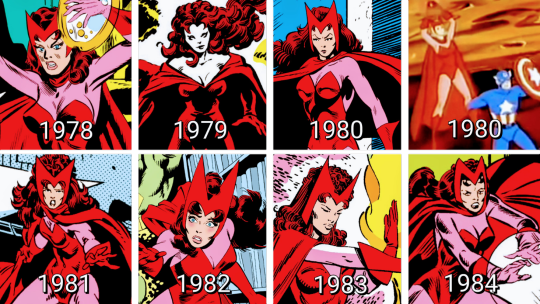
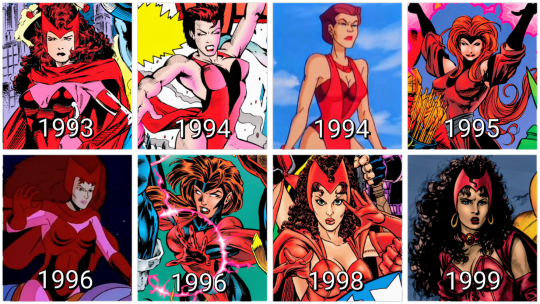

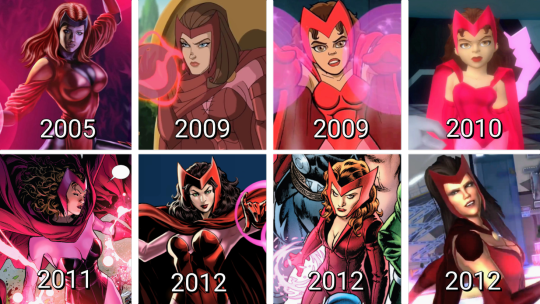
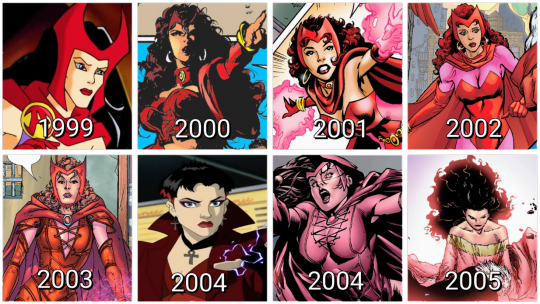
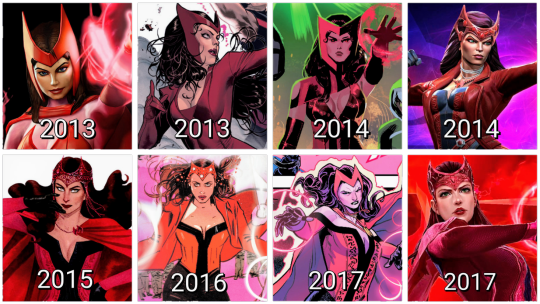
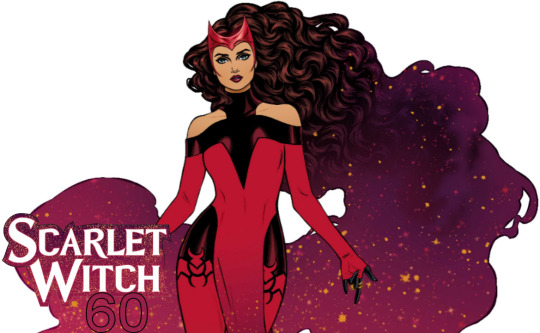
𝟲𝟬 𝙔𝙚𝙖𝙧𝙨 𝙤𝙛 𝙎𝙘𝙖𝙧𝙡𝙚𝙩 𝙒𝙞𝙩𝙘𝙝
(inspired by 40 Years of Psylocke)
→ First appearance: X-Men vol.1 #4 (1964)
→ Writers: Stan Lee (creator), Roy Thomas, Len Wein, Steve Englehart, Bill Mantlo, Jim Starlin, Chris Claremont, Mark Gruenwald, Steven Grant, Ralph Macchio, Roger Stern, Dennis Mallonee, John Byrne, Dann Thomas, Andy Lanning, Dan Abnett, Kurt Busiek, Geoff Johns, Brian Michael Bendis, Allan Heinberg, Rick Remender, James Robinson, Jim Zub, Al Ewing, Kelly Thompson, Steve Orlando & more.
→ Artists: Jack Kirby (creator), Don Heck, George Tuska, John Romita Sr., John Buscema, Sal Buscema, Rick Buckler, Bob Brown, Gil Kane, Jim Starlin, Jim Mooney, Jerry Bingham, Michael Golden, Rick Leonardi, Dan Green, Al Migrom, Richard Howell, John Ridgway, John Byrne, Steve Butler, David Ross, Andy Kubert, John Higgins, Mike Deodato, Ian Churchill, George Pérez, Joe Jusko, Mark Texeira, Alan Davis, Kieron Dwyer, Scott Kollins, David Finch, Olivier Coipel, Jim Cheung, John Cassaday, Jorge Molina, Daniel Acuña, Kevin Wada, Tula Lotay, Sean Izaakse, Pepe Larraz, Paco Medina, Javier Pina, Cian Tormey, Sara Pichelli, Russell Dauterman & more.
→ Costume designers: Jack Kirby, Don Heck, John Buscema, John Byrne, Richard Howell, Al Migrom, Colin McNeil, Mike Deodato, George Pérez, Alan Davis, Kieron Dwyer, Olivier Coipel, Jim Cheung, John Cassaday, Daniel Acuña, Kevin Wada & Russell Dauterman.
→ 𝘼𝙣𝙞𝙢𝙖𝙩𝙚𝙙 𝙖��𝙖𝙥𝙩𝙖𝙩𝙞𝙤𝙣𝙨: Vita Linder (The Marvel Super Heroes), Katherine Moffat and Jennifer Darling (Iron Man), Susan Roman (X-Men: The Animated Series), Stravoula Logothettis (Avengers: United They Stand), Kelly Sheridan (X-Men: Evolution), Kate Higgins (Wolverine and the X-Men) & Tara Strong (The Super Hero Squad Show)
→ Various games: X-Men Legends II: Rise of Apocalypse, Marvel Super Hero Squad: The Infinity Gauntlet, Marvel: Avengers Alliance, Marvel Avengers: Battle for Earth, Marvel Heroes, Marvel Contest of Champions, Marvel Future Fight, Marvel Ultimate Alliance 3: The Black Order & more.
→ Current books: Scarlet Witch & Quicksilver by Steve Orlando & Lorenzo Tammetta, The Avengers (vol. 9) by Jed Mackay & C.F. Villa, Avengers United: Infinity Comic by Derek Landy & Marcio Fiorito, Blood Hunt by Jed Mackay & Pepe Larraz; Scarlet Witch (vol.4) by Steve Orlando & Jacopo Camagni
#wanda maximoff#scarlet witch#marvel#marvel comics#comics#comicedit#wanda django maximoff#wmaximoffcomicedit#marveledit#russell dauterman#kevin wada#xmen#xmen comics
343 notes
·
View notes
Text
Iceman Almost Came Out as Gay Back in the 1990s
So prior to Brian Michael Bendis revealing Iceman (aka, Bobby Drake) was gay in the pages of his All-New X-Men run from 2015, apparently writer Scott Lobdell had planned to have Bobby come out of the closet two decades earlier but was unable to go through with his plans. Lobdell did however, lay the ground work for Bobby coming out during his time on the X-books in the mid-to-late 1990s.
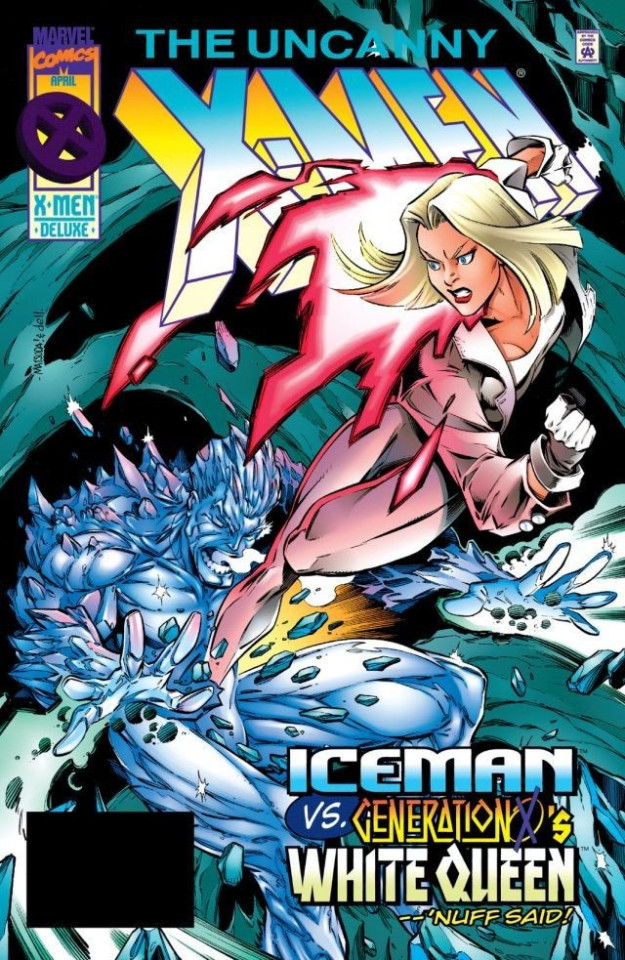
Specifically, during an encounter with Emma Frost back when she was still a villain, the former White Queen of the Hellfire Club briefly took control of Bobby’s mind and actually used his mutant powers in more creative ways than he ever had done before. Emma accurately pointed out that Bobby was intentionally holding back the true potential of his powers, and was using humor as a shield to mask his own insecurities due to his conservative upbringing by mutantphobic parents.
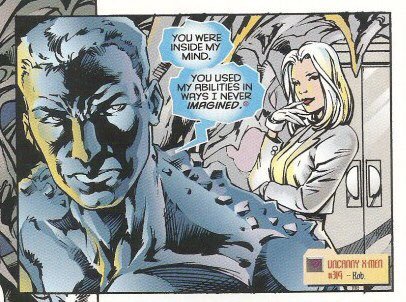
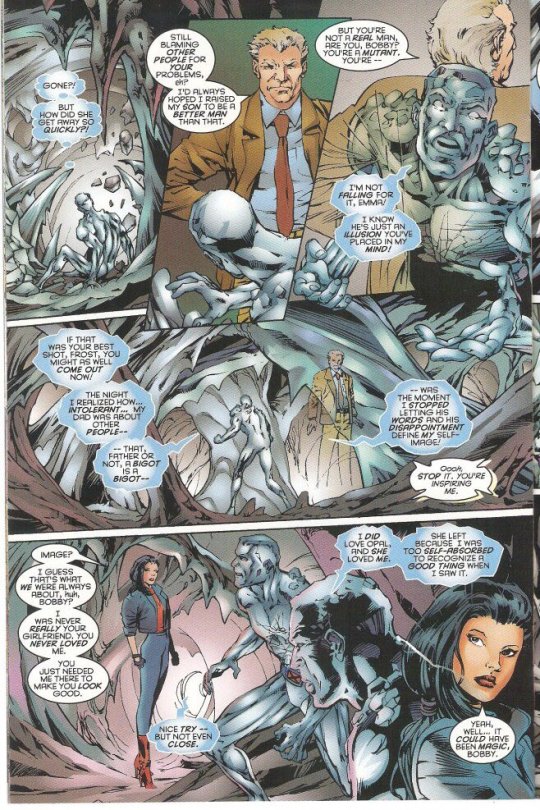
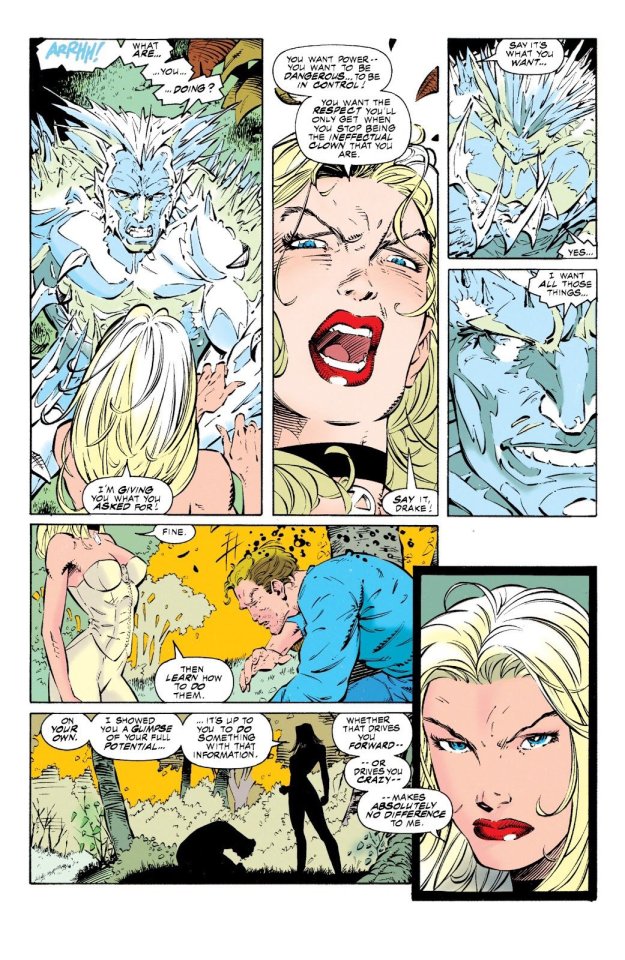
Writer Sina Grace actually followed up on this old plot point from the 90s during his Iceman solo-series which immediately followed Bobby being outed by the time-displaced Jean Grey in All-New X-Men. In addition to depicting Bobby becoming more comfortable with his sexuality and gradually out to his fellow teammates, ex-girlfriends like Kitty Pryde, and especially his bigoted parents...
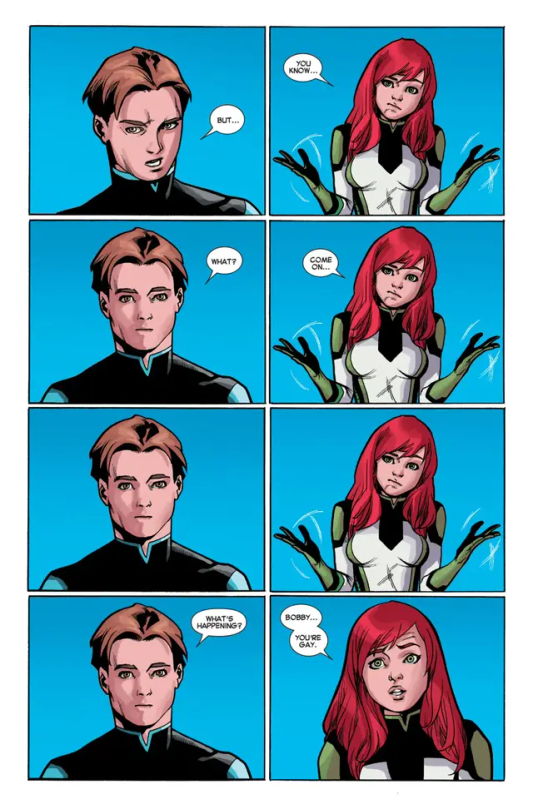
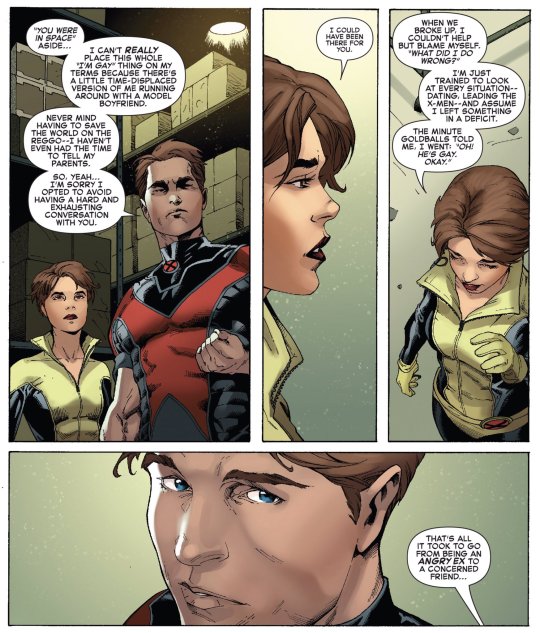

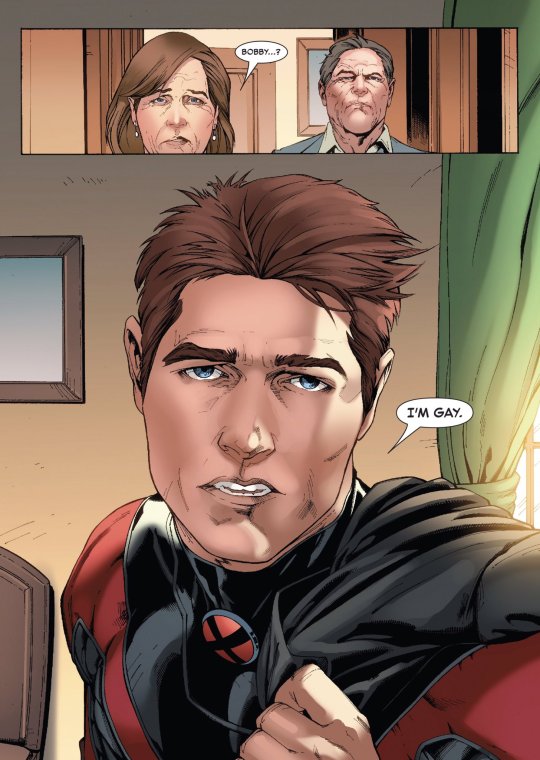
...Grace finally allowed Bobby to fully embrace his potential as an Omega-Level mutant. Not only did Iceman singlehandedly defeat the unstoppable Juggernaut in combat after after overcoming his greatest fear by coming out to his parents, but he began using his powers in more creative ways than before such as constructing ice-shuriken and multiple ice-clones and kaju.
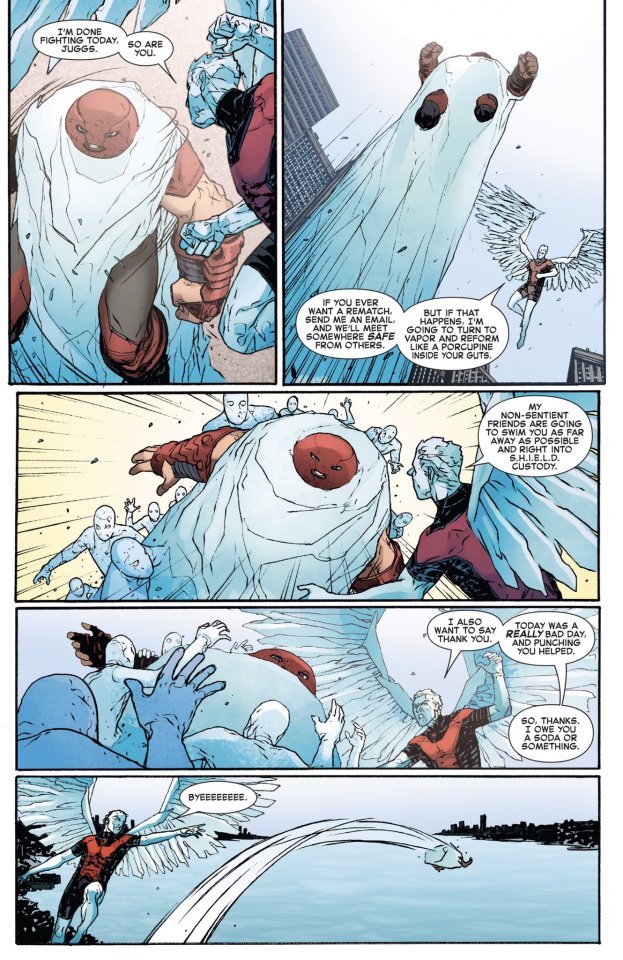
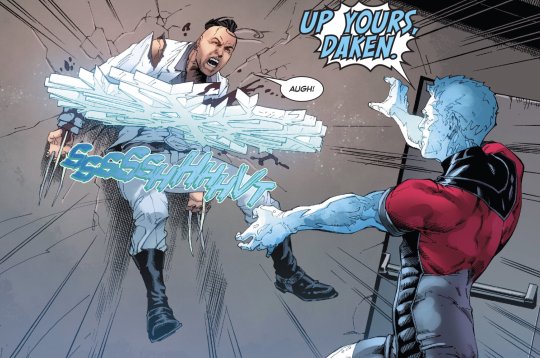


Furthermore, Grace also revealed in his run that yes, during that time Emma Frost had mind-controlled Bobby back in the 90s, she actually did learn that Bobby was gay. But unlike the time-displaced Jean Grey, Emma never outed Bobby’s closeted sexuality to him or anyone else, and instead respected his privacy due to her own tragic experiences with her older brother Christian Frost being forced into "gay conversion therapy" (aka, torture...) by their abusive father.


Essentially, all of the people who try to argue that Iceman coming out makes zero sense or that it somehow "ignores/erases several decades of past continuity" (I'm looking at you homophobic Comicsgaters!) completely miss the fact that both Bendis & Grace were simply building upon the foundation that was already put in place by Lobdell back in the 90s! That’s NOT “ignoring or erasing several decades of continuity,” but the exact opposite!
And if you still need further proof that Bobby was always gay, just a reminder that during his very first appearance in X-Men (1963) #1 by Stan Lee & Jack Kirby, Iceman was the only person who was not acting like a horny jack-rabbit at the mere sight of the then-new student Jean Grey.
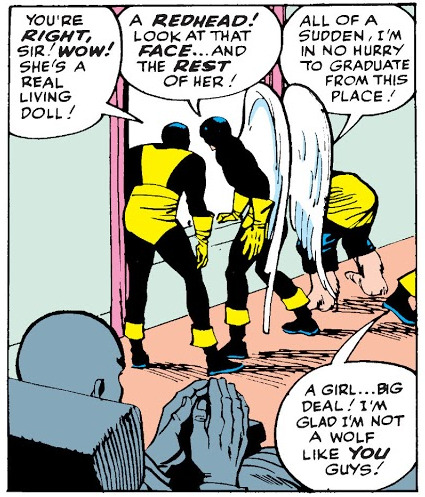
In other words... Iceman was always gay even as far back as his inaugural issue! Suck it Comicsgaters!
#mini essay#iceman#bobby drake#iceman is gay#lgbtq+#gay rights are human rights#queer rep in media#scott lobdell#brian michael bendis#sina grace#emma frost#jean grey#x men comics#marvel comics#90s comics#silver age comics#stan lee#jack kirby#kitty pryde#comicsgate is a hate group#suck it homophobes!#christian frost
418 notes
·
View notes
Text
Okay, guys, I have to be so honest, the cyborg Jon stuff is not actually out of nowhere if you've been paying attention to the themes and ideas present in Jon's story. Actually, something to this affect has been hinted and foreshadowed all the way back in Supersons.
Jon's story, fundamentally, has always been about agency, and how being the son of a public figure like Superman hinders his ability to self-determinate. It is an idea that is present in every story, yes, every single one, starting from his debut as a character.
The cyborg stuff isn't meant to be a replacement of past traumas- it is an evolution, the thesis of what all the things he's been through have been leading up to. It is the ultimate culmination of everything Jon has been struggling with his whole life- being seen as nothing more but a tool that can be exploited.
Clark and Lois robbed Jon of knowledge about who he was for a large portion of his childhood (1). Manchester Black tried to use Jon as a weapon against his father, actively possessing him in order to do it, explicitly against Jon's wishes and opinions (2). Kid Amazo wanted to use Jon as a flesh puppet, a new healthy body that he could take over (3). Ultraman robbed years of his life and literally confined him in a place where he, literally and metaphorically, had no power. Jor El and Jon had a whole conversation about fate vs. free will in the age up arc (4). The entire central conflict of Son of Kal El was Jon fighting against a capitalist dictator who was trafficking marginalized people, altering and taking over their bodies for profit (5). Adventures of Superman Jon Kent has Jon going up against a version of his father thats a dictator, a man who has (in the words of the text) made the whole world a prison (6). In all of these situations, Jon's put in these positions specifically because he is the son of Superman, and he will forever be defined by it against his will. It is commentary on what it means to be the child of a hero, and it is an exploration of legacy that I think is very very interesting.
We've BEEN headed here! It was always going to come to some plotline of this nature. Sure, we couldn't know it'd be specifically this, him getting borged was specifically a surprise, but Mark Waid is an incredibly intelligent writer who knows what he is doing and does not just present events in a story, but ideas. The Speed Force is a love story. Absolute Power is about, well, power. And Jon Kent is fundamentally, at his core, about agency. The robot stuff isn't meant to be strictly literal!
Post Bibliography so you can check that I'm not bullshitting you. I didn't want to go look up panels because I'm laaazy, you can go see for yourself:
Superman: Lois & Clark by Dan Jurgens
Super-sons by Peter J Tomasi
Superman Rebirth by Peter J Tomasi
Superman 2018 by Brian Michael Bendis
Superman: Son of Kal El by Tom Taylor
Adventures of Superman: Jon Kent by Tom Taylor
#Guys please. Please consider the themes.#Comic books DO have them#Often its frustrating because frequently I see incredibly intelligent analysis followed by 'i wish it was intentional'#IT IS!!!! BELIEVE IN YOURSELF!!! BELIEVE IN YOUR ABILITY TO RECOGNIZE PATTERNS#you can recognize themes and patterns in a body of work dattebayo#jon kent#jonology#dc#dc comics#jonathan samuel kent
66 notes
·
View notes
Text
Dorothy's Big List of Comic Book Recs - Marvel Comics Edition
I often get asks about getting into comic books, and how daunting it seems, given the huge back catalog of titles and issues available. I'm here to tell you it doesn't have to be scary! From miniseries that act as good introductions to characters to runs on ongoing titles by individual creators that serve on jumping-on points, there's lots of ways to get into comics without having to have a lot of background knowledge, and I'm going to give you a lot of potential places to start. Please note that this post only covers Marvel Comics; this is a companion to my DC list and I will also have a list for indie comics and smaller companies at some point. Also note that I haven't read everything, and I won't recommend something I haven't read, so a few runs or books some consider must-reads may not be on here. This is based purely on books I have read and enjoy, and that I think are suitable for new readers.
SPIDER-MAN
The Amazing Spider-Man (1963) by Stan Lee, with artists Steve Ditko and John Romita, Sr.: The classic Spider-Man stories which laid the foundation for the character. These stories are filled with the melodrama and pathos that really makes Spider-Man shine, and with two of the greatest artists of the Silver Age on deck, you really can't go wrong. Ditko stays on the book until issue 38, and Lee's run ends at issue 110.
The Amazing Spider-Man (1963) by Gerry Conway, with artists John Romita, Sr., Gil Kane, and Ross Andru: Picking up immediately after the end of Stan Lee's run, Gerry Conway wrote issues 111 to 149. This run includes a number of vital Spider-Man stories, including Spidey's climactic tussle with the Green Goblin and his first brush with the nightmares of cloning.
The Amazing Spider-Man (1963) by Roger Stern: Spanning issues 229 to 252, this brief but memorable run includes several iconic Spider-Man stories and the debut of the Hobgoblin.
The Amazing Spider-Man (1963) by Tom DeFalco and Ron Frenz: DeFalco wrote the book from 253 to 285, and this run included the debut of Silver Sable as well as Spider-Man's black suit.
The Amazing Spider-Man (1963) by J. Michael Straczynski: This should be read in omnibus format as the numbering is a little weird; the run starts during volume 2 of Amazing but the book switched back to volume 1 and original numbering partway through. One of my favorite runs on the book! The creator of Babylon 5 brings Peter Parker into the 21st century, giving him a job as a science teacher and first hinting there might be some destiny at play in how he got his powers. There are a few warts on this run, however, mainly due to editorial mandates: it contains the dreadful "Sins Past" storyline and it ends on the wet fart that is "One More Day."
Peter Parker, the Spectacular Spider-Man (1976) by Bill Mantlo and Al Milgrom: The sister book to Amazing often goes a little overlooked, but this is a great run on it, including one of the best Doctor Octopus stories in Spider-Man history.
Peter Parker, the Spectacular Spider-Man (2017) by Chip Zdarsky: Spectacular was brought back in 2017 with writer Chip Zdarsky at the helm, and it's great. The standout story is probably issue 6, "My Dinner with Jonah," which is one of my favorite Spider-Man issues ever.
Spectacular Spider-Man (1988) by J.M. DeMatteis and Sal Buscema: This run spans issues 178 to 203, and includes Spider-Man's final battle with the second Green Goblin, the standout storyline of the run. DeMatteis also had a turn writing Amazing, but I wouldn't wish the Clone Saga on any new reader.
Spider-Girl (1998) by Tom DeFalco and Ron Frenz: An alternate universe title set in the future and starring the daughter of Peter Parker and Mary Jane, it's great superhero fun featuring everything that made classic Spider-Man great.
Ultimate Spider-Man (2000) by Brian Michael Bendis and Mark Bagley: Another alternate universe book which sought to reintroduce Spider-Man to a new generation. It's a solid book and a good read, but it is very dated to the 2000s for good and for ill.
Ultimate Spider-Man (2023) by Jonathan Hickman: Another alternate-universe take on Spider-Man, this time reimagining him as a family man who gets his powers in his 30s. Whereas most Spider-Man takes start Peter off as a kid with power but no responsibility, this flips the script by having him as an adult with responsibility but no power, as he finds himself drafted into a war against the forces that have taken control of the world.
Miles Morales: Spider-Man (2019) by Saladin Ahmed: Hot off the heels of Into the Spider-Verse, Ahmed's run on Miles' title pushes him forward and secures his place as a leading light of the Marvel Universe, and even gives him his own Clone Saga.
Miles Morales: Spider-Man (2022) by Cody Ziglar: This title is ongoing, but it's a great read that continues the work of carving out Miles' niche in the Marvel Universe and taking him in new directions.
Spider-Man: Life Story (2019) by Chip Zdarsky and Mark Bagley: A thoughtful and heartfelt story that takes Peter Parker on a real-time adventure through the decades, beginning in the 1960s.
Spider-Man 2099 (1992) by Peter David: A cyberpunk romp through a futuristic New York, featuring corporate oppression and intrigue. Miguel O'Hara's best run as Spider-Man.
X-MEN
X-Men (1963) by Stan Lee and Jack Kirby: The initial run of the X-Men lays the groundwork for everything to come, but the book didn't sell well or retain Stan's attention the way Spider-Man or the Fantastic Four could, and he left the book after issue 19. Roy Thomas took over for the rest of the 60s, and there's some good stories in there too, but the real great stuff was still to come.
X-Men by Chris Claremont: MUST be read in omnibus format, because this mammoth run spanned over a decade and a half, including multiple titles - not only the main X-Men book but the New Mutants and the stellar graphic novel "God Loves, Man Kills." THE definitive X-Men run, featuring most of the team's most iconic stories.
New X-Men (2001) by Grant Morrison: Not my favorite work by Morrison, but this is probably the most important run after Claremont. Morrison brings a more militant spirit and a focus on radical activism to the X-Men, and the run opens with a bang - though I have to admit that it closes with two of my least favorite X-Men stories.
X-Men (1991) by Mike Carey: Fun stories featuring an eclectic assortment of characters and interesting team dynamics, but the real treat comes when the book becomes X-Men: Legacy, and a character study on Professor X and his son Legion.
New X-Men (2004): Of course, a classic element of X-Men stories is the school setting, and this book brings that concept into the 2000s, focusing on students at the Xavier School and their interpersonal drama. Degrassi with superpowers.
Wolverine and the X-Men (2011) by Jason Aaron: Another school-set book, this one focuses on Wolverine's efforts to run a school filled with mutant teenagers.
X-Factor (1986) by Louise and Walter Simonson: A very 80s team book focusing on the original X-Men, reconnecting after several years apart, and the conflicts they get drawn into, often the result of their own mistakes. Also features the debut of Apocalypse, one of the best X-villains.
X-Factor (1986) by Peter David: After David took over the book, the focus of X-Factor was shifted from being the original X-Men to an oddball group of government-sanctioned mutants. This book also helped flesh out the character of Mystique.
X-Factor (2006) by Peter David: X-Factor returned under David in the 2000s, this time as a detective agency specializing in cases involving mutants. There's a cynical edge to this book which was common in the 2000s but it really works for this title.
X-Force (1991) issues 116 to 129 and X-Statix by Peter Milligan and Mike Allred: Allred's art is worth the price of admission. Imagine a team where every character is expendable, most of them are liable to die in really nasty ways, and they all have weird and uncomfortable powers. That's X-Statix.
Ultimate X-Men (2024) by Peach Momoko: Probably my favorite of the new Ultimate line. Very different vibes to basically any other X-Men book - this one is essentially a horror manga in the vein of Junji Ito or Shigeru Mizuki.
THE HULK
Hulk: Gray by Jeph Loeb and Tim Sale: A moody and gorgeously-illustrated take on the Hulk's earliest days.
The Incredible Hulk (1962) by Bill Mantlo and Sal Buscema: Buscema is one of the best Hulk artists of all time, and while Mantlo's writing can be hit or miss, when he hits he really hits, as in issue 312, one of the best Hulk issues ever written.
The Incredible Hulk (1962) by Peter David: David's run is considered the definitive Hulk run, and for good reason. It is best read in omnibus format because it is very long, and packs a lot into that long tenure. Bruce Banner's Joe Fixit alter debuts here, as does his Professor persona.
The Incredible Hulk (2000) by Greg Pak: This run includes the Planet Hulk storyline! Exiled from Earth, the Hulk rises to power as a warlord on a hostile alien world. Really scratches that Conan the Barbarian itch.
The Indestructible Hulk (2013): A different take on the Hulk, this time recasting him as an agent of SHIELD with all the adventures and difficulties that brings.
The Immortal Hulk (2018) by Al Ewing: Here we see the difference between "definitive" and "best." While David's run is the definitive Hulk run, for my money Immortal Hulk is the best. It is both a gnarly piece of body horror and a deeply thoughtful title that muses on the nature of anger, of suffering, and of pain, drawing heavily on Kabbalistic imagery and themes.
She-Hulk (2004 and 2005) by Dan Slott: An offbeat workplace comedy set in a law office specializing in cases involving superhumans. The best She-Hulk run in my book, not least because it does not involve John Byrne.
DAREDEVIL AND STREET LEVEL STUFF
Daredevil (1964) by Frank Miller: Probably the definitive Daredevil run, and the only time I've been able to stand Frank Miller, this run features some great art as well as some of the most important Daredevil stories in the character's history.
Daredevil (1964) by Ann Nocenti: Carries on from the Miller run and takes the character of Daredevil, his supporting cast, and Hell's Kitchen in some totally new directions. Includes the story of the excellent villain Typhoid Mary.
Daredevil (1998) by Brian Michael Bendis: A gritty, very 2000s take on Daredevil, Bendis' strengths as a writer are on full display during this run, with grungy art to match.
Daredevil (2011 and 2014) by Mark Waid: A much lighter and more superhero-y run than Daredevil often gets, this excellent run features Matt going up against criminal syndicates, old enemies coming back for revenge, and more.
Hawkeye (2012) by Matt Fraction: Easily the best book Hawkeye has ever had. Spectacular art and excellent scripting featuring both Clint Barton and Kate Bishop in a firmly street-level narrative focusing on threats to the local community.
The Punisher (2011) by Greg Rucka: For my money the best the Punisher (whom I usually don't like) has ever been. A genuinely thoughtful examination of Frank Castle as a human. Many people swear by the Garth Ennis run on the character, but to me this is the definitive Punisher run.
Mockingbird (2016) by Chelsea Cain: A short but fun series focusing on Mockingbird in a number of spy thriller scenarios.
Alias (2001) by Brian Michael Bendis: A mature mystery series starring a former superheroine. It goes into some gnarly territory but it really displays Bendis' strengths in writing street-level, grounded stories within the Marvel Universe.
Moon Knight (1980) by Doug Moench: Moon Knight fans will be mad that this is the only run I have on this list but it's the only one I've read! It's a fantastic read though.
Ms. Marvel (2014 and 2016) by G. Willow Wilson: There's a reason that Kamala Khan has been one of Marvel's biggest breakout characters in recent history, and it all starts in this initial run of comics. Great art and fantastic scripts by Wilson.
Runaways (2004 and 2005) by Brian K. Vaughan: One of my favorite setups in a comic, with a group of teenagers learning that their parents are actually a supervillainous cabal and running away from home in response. Great teen drama with a superpowered twist. The second volume also has a run by Joss Whedon (bear with me) that's also pretty good.
TEAMS AND TEAM-UPS
Fantastic Four (1961) by Stan Lee and Jack Kirby: One of the greatest comic books ever written. Both Lee and Kirby poured their heart and soul into these early adventures, and you can really tell. The first Galactus story is still one of my favorites. Essential reading.
Fantastic Four (1998) by Mark Waid and Mike Wieringo: Probably my favorite Fantastic Four run, with a great focus on Doctor Doom, Mister Fantastic, and Ben Grimm.
Fantastic Four (2022) by Ryan North: The current FF run, this one goes all-out on wacky science fiction adventure, with most stories only taking one or two issues to tell. Bite-size superhero fun, with fantastic characterization. Made me stan Alicia Masters.
The Avengers (1963) by Roy Thomas: The initial run of the Avengers by Lee, Kirby, and Heck, is serviceable, but the team came into their own under Roy Thomas, who introduced mainstays of the team like Vision and Black Panther to the roster, in this run which also incldues the classic "Kree-Skrull War" storyline. Throw in art by legends like John Buscema, Sal Buscema, and Neal Adams, and you've got a great run to get into the Avengers with.
The Avengers (1963) by Roger Stern: Another great Avengers run, this one solidified a roster for the team which included members like Hercules, Black Knight, and the best Captain Marvel aka Monica Rambeau, and includes the best "Avengers Mansion is attacked" story.
The Avengers (1997) by Kurt Buseik and George Perez: A creative dream team relaunched the Avengers in the late 90s to fantastic effect, with several excellent storylines and gorgeous art. This is, for my money, the definitive Avengers run.
Young Avengers (2013) by Kieron Gillan: The Young Avengers have mostly been supplanted as Marvel's premiere team of teenage superheroes, but this is their best book in my view, featuring the team's best roster and some of their best stories.
Champions (2016) by Mark Waid and Humberto Ramos: A great teen team book, the Champions have basically replaced the Young Avengers in no small part due to this run. Makes me yearn for a Waid-penned Teen Titans ongoing.
Defenders (1972): I'm just gonna recommend the whole comic. If you want off-beat and unusual superhero team dynamics and out-there storytelling, this is a good bet. Special attention should go to Steve Gerber's run around issue 20 or so.
MAGIC MARVEL
Doctor Strange: The Oath (2006) by Brian K. Vaughn and Marcos Martin: A good entry point to Doctor Strange and his weird world, featuring some really great art.
Strange Tales (1951) by Stan Lee and Steve Ditko: Never has Steve Ditko's art been better than in those first Doctor Strange stories, weird and wonderful and surreal.
Journey Into Mystery (1951) and Thor (1966) by Stan Lee and Jack Kirby: The first Thor stories are not only great, they feature Kirby's excellent Tales of Asgard backups which he would eventually develop into his Fourth World at DC.
Thor by Jason Aaron: Read in omnibus format. A true epic worthy of Norse legend. Includes some all-time great Thor stories.
The Immortal Thor (2023) by Al Ewing: The current Thor run, with a strong focus on mythology and how stories are constructed and passed down across the years.
Scarlet Witch (2023 and 2024) by Steve Orlando: A fun ongoing that finally made Wanda Maximoff a worthy headliner in Marvel, featuring her protecting a small town from magical threats.
COSMIC MARVEL
Silver Surfer (1968) by Stan Lee and John Buscema: One of my favorite comics as a teenager, this book combines space opera and melodrama to great effect.
Silver Surfer (1987) by Steve Englehart, Jim Starlin, and Ron Marz: The definitive Silver Surfer run. Includes some excellent stories, including some from the master of cosmic Marvel, Jim Starlin.
Silver Surfer (1988) by Stan Lee and Moebius: Must be read for the art alone.
Guardians of the Galaxy (2008) by Dan Abnett and Andy Lanning: This is where the MCU team originated, and it's still the best run the Guardians have ever had.
Quasar (1989) by Mark Gruenwald: Has the energy of a Silver Age comic with none of the baggage. Definition of a hidden gem.
Nova (2007) by San Abnett and Andy Lanning: Probably the definitive Nova run? Spun out of Annihilation which as an event comic I haven't included here but is still a great read.
Eternals (1976) by Jack Kirby: It's kind of Fourth World backwash, but it's Kirby doing wacky cosmic stuff so you know it's a good time.
AND THE REST
Power Pack (1984): What if a bunch of kids got superpowers? No, not teenagers, little kids? It's a thoroughly 1980s premise and one that shines best in the original series from that era.
Captain America (2005, 2011) by Ed Brubaker: A high-octane action-spy thriller which reintroduced Bucky and made him Cap for a while. The definitive modern Captain America run.
2001: A Space Odyssey (1976): A short adaptation of the novel and film, and then like 10 issues of wacky Kirby sci-fi. Really great hidden gem.
Black Panther (1998) by Christopher Priest: The definitive Black Panther run, that set the stage for everything to follow.
Black Panther (2016) by Ta-Nehisi Coates: Another great run exploring the nature of power. Many comic fans do not like it because they are philistines.
Vision (2015) by Tom King and Gabriel Hernandez Walla: Tom King is hit or miss, but this book is great, with the Vision building a family - of a kind - for himself.
45 notes
·
View notes
Text
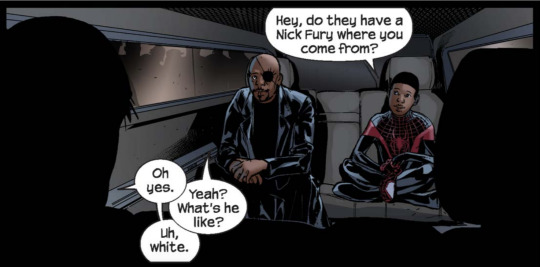
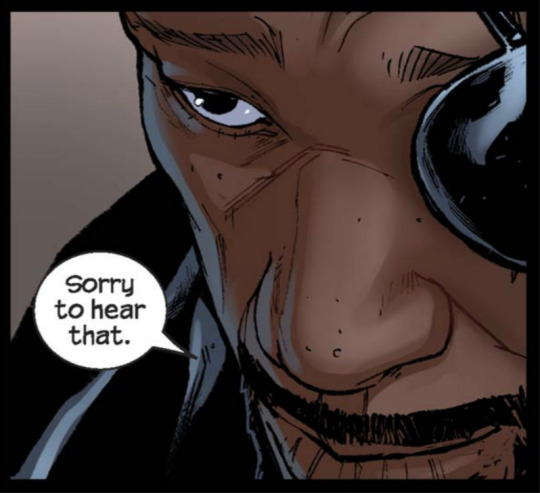
Spider-Men #4 (2012)
#spider-men#writer: brian michael bendis#artist: sara pichelli#year: 2012#decade: 2010s#Earth-1610#nick fury#miles morales
72 notes
·
View notes
Note
Okay so, there are two types of comic book writers. There are literally only two, Nick. Listen to me closely...
There are two comic book writers, the ones that like comic books and therefore whenever they write they will learn everything to make a story tailor made for the setting and characters they've been commissioned to work on. The other type of writers are the ones who have a story in mind and will bend everything they can to make that story real no matter what characters or setting they're given.
Tom King, Grant Morrison, John Hickman, Dan Didio, Leah Williams, Brian Michael Bendis and so many others do not give a single shit. They just want whatever story they have in mind and make it happen... sometimes it's just comic book bullshit but ever so often they hit all the spots to make the most unbelievable OOC shit ever.

bursts into tears on the ground. youre right. youre right
28 notes
·
View notes
Text

Defenders (2017) #6 by Brian Michael Bendis, David Marquez, Justin Ponsor, and Cory Petit
Every time a writer forgets that Danny has healing powers, I want to cry a little, but I still like this panel.
#I mean...listen. It's not even one of his more obscure powers.#Defenders (2017)#Iron Fist#Danny Rand#Black Cat#Felicia Hardy#Daredevil#Matt Murdock#ID in alt text
98 notes
·
View notes
Text

#JusticeLeague #64 (2021) #JasonHoward Variant, #StevePugh Artist, #BrianMichaelBendis & #RamonVillalobos Writers, 1st Appearances of #UnitedOrder, #DaemonRose, #EternalKnight & #RandhirSingh "United Order, Part One" Introducing…the United! This all-new all-star group of alien warriors represents all voices in the newly formed United Planets. A galactic Justice League, if you will. The first Legion of Super-Heroes? Sort of. The United comes to the new Justice League for help because the biggest threat to the universe is on the loose, and all roads lead to…Superman. https://www.rarecomicbooks.fashionablewebs.com/Justice%20League%202018.html#64b @rarecomicbooks Website Link In Bio Page If Applicable. SAVE ON SHIPPING COST - NOW AVAILABLE FOR LOCAL PICK UP IN DELTONA, FLORIDA #KeyComicBooks #DCComics #DCU #DCUniverse #KeyIssue #KeyComics #FirstAppearances
#Justice League#64 (2021) Jason Howard Variant#Steve Pugh Artist#Brian Michael Bendis & Ramon Villalobos Writers#1st Appearances of United Order#Daemon Rose#Eternal Knight & Randhir Singh#Rare Comic Books#Key Comic Books#DC Comics#DCU#DC#Marvel Comics#MCU#Marvel#Marvel Universe#DC Universe#Dynamite Entertainment#Dark Horse Comic Books#Boom#IDW Publishing#Image Comics#Now Comics#Key Comics#Rare Comics#Vintage Comics
0 notes
Note
Pasta! Pasta! Pasta! I think you mentioned that you were currently reading through Daredevil comics. Is there any you recommend as a must read?
I DID! I've gone through a decent amount of runs now, working my way through the Big Rec'd arcs, and it is wild to see all these bits and pieces that I recognize as contributing to the show that really got my love for Matt started, there's some really good shit here.
I'd say Frank Miller's classic The Man Without Fear, and Born Again runs are the biggest Must Read! Having read through some of the arcs that came out before Miller's runs, I get now why people say Miller changed the game with Daredevil. These runs are foundational to all of our modern depictions of Matt, and a huge part of Daredevil's history and development. Miller's arcs aren't necessarily my favorites in terms of pure enjoyment, but they're top of the list because you just get so much of who modern Matt and Daredevil is, distilled down into its purest form.
The Brian Michael Bendis + Alex Maleev run is so gut-wrenching (and somewhat heartbreaking, but what else is new with Matt) in a stunning way, and fleshes out the world around Matt so gd well. The tonal darkness Netflix pulled a lot of its vibe from is on full display, and I loved the importance of characters like Ben Urich. I can see how this run inspired writers that came after, this was another foundational run for Matt. (I'd continue with Brubaker's run immediately after this since it continues the story!)
I know Matt's whole thing is depression, but I feel like Mark Waid's run was a really solid amalgamation of Matt's lighter tone earlier on and the more serious vibe he gets later. This is both a fun read and a solid one, allowing us to kind of see a bit more of what Matt's like when his life's not spiraling from tragedy to tragedy even if he's still taking things seriously when necessary. And damn was this a breath of fresh air. It's on my Must Read list because what's the point of following Matt if we never get to see him happy? This might be my personal enjoyment favorite.
Kevin Smith's Guardian Devil run, not necessarily because I think it's the best but because we really dig into Matt's catholicism here in a way that ends up influencing a lot of what comes later. Must Read for this take alone, since Matt's faith has become a big part of who he is as a character, even if parts of this run are a bit rough (there is sometimes waaay too much text on the page, which from what I understand Smith has acknowledged).
That's what I've got so far! I still have a TON on my list I want to get to (Soule's the next one I'm eyeing) before fully diving into Chip Zdarsky's current run (which I am very excited about), but these are the Big Reads that I think give an excellent sense of who Matt is as we understand him, his history, and how he's developed over the decades. ❤️
#daredevil#waid might be my favorite run so far for personal enjoyment#but these were all excellent runs tbh for understanding our Matt on a fundamental level#and understanding where it is he COMES from. all these important pieces writers have added that are built on later.#my reading order is a bit chaotic because i didn't follow the reading order guide someone had directed me to BUT#the frank miller runs are def first to read i think#then probably Smith's run and then Bendis's run#i have no idea where this all stands on comic!matt discourse cause I'm not plugged into that but those are my personal recs!
25 notes
·
View notes